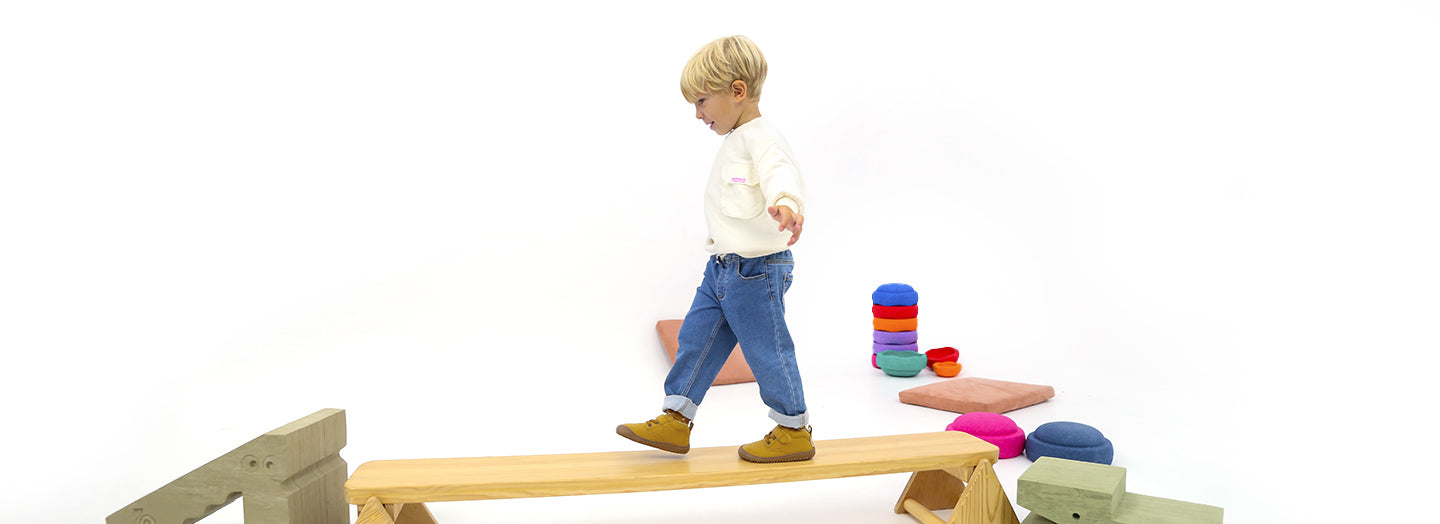Although in many cultures babies don't wear diapers, either because they don't have them or because tradition dictates otherwise, in the West, for many decades now, from the moment babies are born, we have been putting a diaper on them to control both their urine and feces.
I believe that when we get a baby used to something because it works for us, we should be as respectful as possible when weaning them off it. Therefore, it's important to remember that respectful potty training isn't a one-time event marked on a calendar, but rather a process that accompanies the development of their autonomy, with its ups and downs.
⏳ When is your little one really ready?
The first step is to understand that there is no "ideal age" for potty training in a respectful manner. The Haizea-Llevant psychomotor development studies, which guide "Well Child" checkups in pediatric clinics, tell us that by 30 months, only 50% of children are toilet trained. By 36 months, 75% of children are toilet trained, and it's not until 42 months (3.5 years) that 95% are toilet trained.
This means that every child has their own rhythm, and it's not true that diapers should be stopped at age 2. Nor is it true that they should start school in September. Hence the following warning: pushing this process too early can lead to frustration and problems with denial and constipation. Therefore, rather than focusing on their age, we should observe clear signs of readiness:
Physical and neuromotor signals
- More time begins to pass between dirty diapers.
- He is able to walk, run and climb stairs.
- He knows how to pull down his underwear and pull it back up, even if he needs help.
Cognitive and communicative signals
- Understands words related to pee, poop, and potty.
- Identify the feeling of wanting to and express it before doing it (even if you still do it on yourself).
- Show interest in what adults (or other children) do in the bathroom.
Emotional maturity and a pressure-free environment
- He wants to do things for himself: he is leaving the baby stage behind, as he is increasingly independent in every sense (he drinks from a cup, doesn't use a pacifier, puts on and takes off some clothes, picks up dirty dishes...).
- He understands that he can express emotions and that he can modify our behavior with his actions and words.
- He is not experiencing a major emotional change (the birth of a sibling, moving, starting preschool, etc.).

🛠️ Tips for respectful diaper removal
Supporting respectful potty training involves, above all, facilitating the process, without forcing or imposing. Remember: you put the diaper on, let your little one take it off.
Create a prepared and safe environment
Place an accessible potty, a toilet training seat with a step so they can rest their feet (if they feel unsteady they won't want to sit down) and take the diapers to the bathroom.
Establish routines without pressure.
If you think he's ready, you can offer him a diaper-free time for a while. If the temperature is right, it might be a good idea to leave him without clothes from the waist down . There will come a time when he will have to pee or poop, and he will probably do it on the floor. This way, he will understand what pee is and how he did it, what poop is and how it felt.
He will also understand (sometimes we have to help him) that poop is not a part of his body , and that the place it belongs is the toilet, because that is where we will throw it away.
This will be a good time to explain what just happened:
“I see you peed/pooped. I'm going to clean it up. Come with me, I'm going to flush the poop in the toilet. Then we can say goodbye and you flush. Next time, you can do it in a diaper, in the potty, or in the toilet. Let me know, and we'll go to the bathroom, okay?”
So, every time this happens, we should explain this to him until he lets us know one day and we can accompany him to the bathroom, asking him what he prefers: " Do you want a diaper, do you want the potty, or do you want to do it on the toilet?" (it's better in this order, since if the last thing you say is "diaper," you increase the likelihood that he'll choose it). And let him choose what he thinks is best. His decision will always be valid , since ultimately what we want is for him to become toilet trained, regardless of where he does it.
Important: Don't sit your child on the potty or toilet for short periods of time, or set a schedule . Just wait for them to let you know. However, we should offer to go to the bathroom at key times of the day (before bed and if we're going out), and let them see that we go at those times too. But don't force them to do it if they don't want to.
Wear clothes and shoes that are easy to remove
By the time you're already starting to give your warning, and given that you'll sometimes be late or just in time, it's advisable to wear elasticated pants , without buttons or suspenders, and slip-on shoes that are easy to clean . The more independent you can be, the better.
Normalize accidents calmly
Talk naturally about leaks: "You peed. Let's change. Next time you can let me know and we'll go to the bathroom." The important thing is not to ridicule or punish.
Encourage participation in the clothing exchange
Let him choose his underwear, take off and put on his pants, help with cleaning...
Use stories and games that help anticipate
Many children's stories address the topic of toilet training. They're a great tool for talking naturally about this process. You can also play with stuffed animals and dolls, playing anything you like, and then, suddenly, one of them has to go to the bathroom and says, "Wait a minute, I have to pee," and then the child stops playing and goes to the bathroom to pee (we take the stuffed animal, put it in the child's potty, and say, " Pssss "). This way, the child will normalize and understand even more everything related to elimination.
Better not to congratulate
It's not that it's horrible to praise a child when they do what you expect, but some children get so excited about praise that they later become disappointed when they get away with it , and they feel like they've done something wrong, because obviously, there's no praise. It's better to normalize all the steps of learning: the successes and the mistakes, without congratulating or scolding either.
What to do if there is no clear progress
It's possible that, despite doing everything respectfully, we notice that our little one isn't letting us know, that days go by without any progress, and that they might even start to get overwhelmed by the issue. In this case, it's best to tell them that we're going to put them back in diapers , and that they can try again in a few weeks (hence the importance of not having anyone tell them, " You're not going to wear diapers anymore because you're not a baby anymore / you're older now" ).

🌙 And at night? Respectful potty training at night
Nighttime potty training is a slower physiological process, which can happen months or even years after daytime potty training. The easiest way to know when your baby is ready to quit is to observe how he or she wakes up. If your baby wakes up dry for several nights in a row , we can offer to try sleeping without a diaper.
pediatric nurse and our Jedi of respectful parenting.







